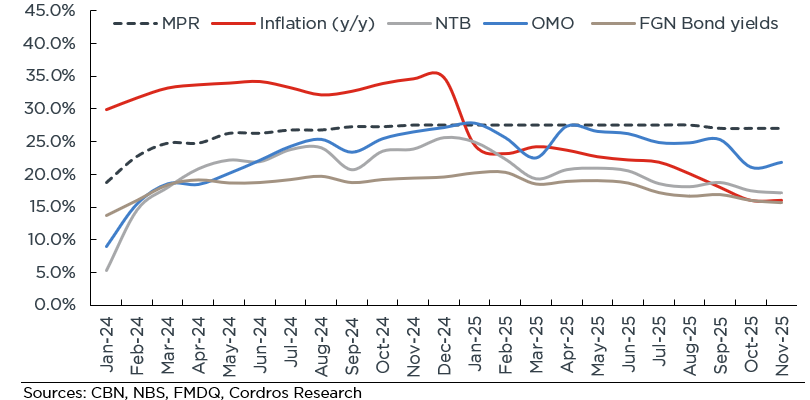
Left to Right: 2nd left, Ayokunle Adaralegbe, Head of Risk, CSCS Plc, guest speaker and GMD, Dunn Loren Merrifield and President, Association of Issuing Houses of Nigeria (AIHN), Sonnie Ayere; Oladele Afolabi, Director, Debt Portfolio Management, Debt Management Office; Ms. ‘Kaodi Ugorji, Head, Corporate Planning, FMDQ; among others at the 2017 CAMCAN Annual Workshop on Saturday, December 9, 2017.
Sonnie Ayere, President of the Association of Issuing Houses of Nigeria (AIHN), at the weekend insisted that deepening the nation’s capital market goes beyond just product innovation, which would always come when operators become stronger.
He lamented a situation today, where most capital market operators are comatose and unable to pay salaries of their staff, because the majority remains small fringe players with no access to borrow from a financial system that has been cornered by their bank cousins.
Ayere, Group Managing Director, Dunn Loren Merrifield, who was guest speaker at the 2017 annual conference of Capital Market Correspondents Association of Nigeria (CAMCAN) in Lagos, proposed reforms to the Securities and Exchange Commission licenced operators that would enable qualified financial intermediaries have dual licences like a Money Market Dealing Licence (MMDL) issued and regulated by the Central Bank of Nigeria (CBN) and a Capital Market Dealing Licence (CMDL), issued and regulated by the SEC.
This, he believes, would “provide a much stronger platform for market based financial intermediation to thrive, ensure that they are well capitalized and regulated.”
By giving Money Market Dealing House (MMDH) access to the interbank market, they would borrow and essentially “fund the same or better risk quality assets than the deposit money banks are holding,” with rules set and monitored to ensure “that for every N1 borrowed from Interbank or elsewhere, not less than N0.60k of that amount MUST be held in liquid assets as determined by the CBN
“Every N1 borrowed from interbank, is collaterized by 60% AAA liquid assets and 40% weighted average single A – BBB rated assets which on balance provides a weighted collateral/security rating of AA (This is much stronger than normal collateral provided to DMBs by normal borrowers)
“As these institutions (develop), their dependence on Interbank funding will begin to reduce as they build up capital from retained earnings and are able to issue their own commercial paper/notes/bonds/certificates etc as alternative, longer and more stable funding source.”
Effective monitoring is easy, he said, with the aid of technology which allows for on-line, real time reporting systems unlike the situation five years ago, he said, proposing “that the daily funding and asset balances of each MMDH are reported to the CBN by the MMDH and the Exchange individually with the CBN able to reconcile end-of-day balances.”
As part of monitoring, each “MMDH reports its daily activities directly to CBN; the Exchange reports the MMDHs daily activities to the CBN; (and the) CBN Reconciles each report and the end of day account balances of the MMDH’s account(s) at the CBN.”
He recalled that the financial system began to get it wrong when the Primary Dealers/ Market Makers licence in the days of Professor Chukwuma Soludo era as Governor of the Central Bank of Nigeria (CBN) that was meant for all investment banking outfits with a market capitalization of N2bn, was restricted to commercial banks.
Today, contrary to the original plan, he said, “capital market operators currently regulated by the Securities & Exchange Commission (SEC) are cut out of the Primary Auction Market for Treasury Bills.”
To remedy the situation and ensure a deeper and healthier the financial system, he proposed that the CBN allows “capital market institutions with the requisite capital (as agreed by the CBN) access to Primary Auctions on behalf of themselves and their customers.
“Discount window access can then be given to such operators to be able to discount for liquidity purposes all instruments normally acceptable to the CBN,” these include, he continued: Treasury Bills, Certificates, Government Bonds and other instruments, which would ensure capital market operators play a more robust role in the financial markets and ensure them access to liquidity.
In that way, he said, capital market operators with the requisite capital can be money market dealers without any further licencing or regulatory responsibility required.
Besides capital, such operators, he said, must be able to maintain and manage a CBN account and comply with the rules governing the TB and Treasury Certificate issuance, the secondary market trading rules and rules accessing the discount window.
“We believe that achieving this can only lead to a more robust financial market, a deeper pool of technically savvy operators that can seamlessly transmit monetary policies to all segments of the financial markets with little or no discernible systemic or operational risks,” he stressed, describing as unfortunate, a situation where at about N800m, the entire capital of all capital market operators remains less than a quarter of the smallest bank in the country today.
Resulting from the challenges faced by capital market operators in funding their businesses, Ayere said, is that “they cannot easily access the short term money market, or repurchase (Repo) markets for liquidity, which adversely impacts their sales and trading operations.
Consequently, “their fixed income traders trade without real-time information and are effectively sidelined to limited brokerage only- no real added value from liquidity stand point.”
For this reason, he continued, “their equity trading businesses are also mainly small brokerage operations, and market making is highly inefficient for similar reasons,” while underwriting costs are significant thereby severely curtailing their ability to originate, hold, distribute and trade.
“The aforementioned significantly curtails the services they offer and the impact they can have on economic development; the economy loses the catalytic benefits of investment banking to economic development.”
Arising therefrom, the continued existence and viability of these businesses is significantly threatened and may not survive for much longer without access to wholesale funding.
Capital market operators in their number, he continued, are not creating jobs today, as most of them are seeking employment elsewhere, because most cannot fund their businesses or even pay salaries.
He also recalled that the journey to get things right in the capital market began 2004 in the days of Ms. Arunma Oteh as director-general of the Securities & Exchange Commission (SEC), when the CBN was enjoined to create what is called a universal broker licence that would be also regulated by the apex bank and able to play in the nation’s inter-bank market.
Arising from the fact that this was and is not done till date, he lamented the capital market is today in a situation where an issuing house cannot underwrite one bond, as a result of which the impact the operators can have on economic development is lost.
Nigeria’s capital market today “continues to operate in “silos” with limited access to the money markets which provide the base liquidity of all financial markets … there is no funding source for the market.”
In a situation “here different parts of the market are concentrated in silos, there are only a handful of institutions that can create, price and trade instruments across the curve hence, the impact on the economy is sub-optimal,” he stressed further.
The market blossomed in the past, he continued, because individuals and corporate entities could borrow to buy stocks, but unfortunately, banks turned margin loans into term loans.
He challenged the financial sector regulators to work towards building a financial market rather than also operating in silos at a time the market has become more integrated than ever before.
Whereas liabilities are necessary to fund an institution’s creation of assets, the AIHN President lamented further that “institutions under SEC purview have been denied access to the market’s deepest liquidity pool (and that) without this very important variable, the securities businesses will remain very small with very little if any, impact on the wider economy.”
In her presentation Ms Kaodi Ugoji, Vice President and Divisional Head, Corporate Planning, agreed that the nation’s capital market is plagued by a lack of depth, lack of regulatory framework and high focus on risk-free securities. The challenge of poor market depth, she said, however offers opportunity for growth with more innovative products at a time when many end users have become more aware and better educated.
Other challenges faced by the market, she said, include high costs, low primary issuance, high interest rate environment, poor transparency, lack of legal/regulatory frameworks, high focus on risk-free securities, preference for investment grade bonds and high rate of speculation, especially in the equities market.
There is also illiquidity, she continued, because companies are forced to borrow short-term funds to finance long term projects, leading to funds mismatch.
As a way out, she urged for stable macroeconomic environment to deepen the market, reduce transaction costs and lower capital requirements for corporate issuers, besides creating more awareness on the importance and benefits of investing in the capital market. There is the need, she continued, “to structure investment grade transactions from less investment grade companies.”
Ugorji called for an increased number of market makers to boost liquidity; effective coordination and cooperation between market participants; increase efficiency of trading platforms by ensuring ease of information flow; just as the need to strengthen the regulatory framework of the market to boost the confidence of investors.
She also spoke of the dare need to introduce measures that would enlarge the domestic institutional investors’ base, particularly through pension sector reforms, adding that a strong and viable domestic capital market as an alternative source of finance in emerging economies has been affirmed by the success stories from countries like: Brazil, Malaysia, Russia, India and China.
“With government’s economic reforms running at full throttle, prospects are high for the sustained development of the Nigerian Capital Market as a viable tool for driving Nigeria’s economic growth.
“Countries that have successfully leveraged the capital market for economic growth have a number of similar characteristics, some of which include: large domestic institutional investor base, developed infrastructure, macroeconomic stability.”
Also speaking at the event, the Acting Director-General of Securities and Exchange Commission (SEC), Dr Abdul Zubair, disclosed that the total value of issuances in the Nigerian capital market, comprising equities, bonds and unlisted securities among others, amounted to N1.55tr in September 2017, representing 12% of total value of issuances in the market during the period.













